Emeritus professors

|
Charles Joseph Adams
Institute of Islamic Studies
In 1963, Charles Adams was appointed Director of McGill's Institute of Islamic Studies and he held that post for almost 20 years. His association with the institute, however, began more than a decade earlier when he came to study at the newly founded institute in 1952. He left to teach for a year at Princeton and came back to McGill when he was awarded a three-year Ford Foundation Foreign Training and Research Scholarship. He spent part of that time in Pakistan, returning to McGill in 1954.
A native of Houston, Texas, Adams received a BA from Baylor University in Waco, although his education was interrupted by a stint as an airborne radio operator in World War Two. He went on to the University of Chicago Divinity School, where his studies were again interrupted when he was called up to serve briefly during the Korean War. He was awarded a PhD in the History of Religions from the University of Chicago in 1955.
He became a McGill faculty member in 1960, and throughout his teaching career, Adams refused to delegate responsibility for introductory courses to teaching assistants. Said a colleague in a tribute to Adams on his 65th birthday, "His teaching, masterful never arrogant, summoned the inherent dignity of both Islam and the student to meet in the classroom. The inevitable mutual respect generated optimum conditions for learning."
As a writer on Islamic culture and religion, he contributed numerous articles to the Encyclopedia Britannica, the World Book Encyclopedia and Encyclopedia Americana, as well as many book chapters. He edited A Reader's Guide to the Great Religions, which became an important text for teachers and students of religion. He also served for many years as editor of the Religious Studies Review.
|
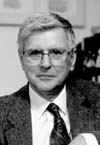
|
Dr. Yves Clermont
Anatomy and Cell Biology
Born in Montreal, Yves Clermont received his BSc in biology from Université de Montréal in 1949 and his PhD in anatomical sciences from McGill in 1953. His PhD thesis on spermatogenesis, performed under the supervision of Dr. Charles Leblond, has influenced generations of scientists studying the male reproductive system. Clermont's latter work in this and other areas continues to draw attention from colleagues internationally. He has published more than 140 research papers.
After post-doctoral studies at the Collège de France in Paris, he returned to McGill as an assistant professor in 1956. He became a full professor in 1963 and chaired the Department of Anatomy from 1975 to 1985. In 1990, he was the recipient of the Osler Award, the Faculty of Medicine's top prize for outstanding teaching.
A Fellow of the Royal Society of Canada, Clermont has participated in the activities of a number of granting agencies, including the Medical Research Council of Canada, the National Institutes of Health (USA), the Ford Foundation and the Fonds de la recherche en santé du Québec.
Clermont has received several awards during his career, including the Ortho Prize from the Canadian Society for the Study of Fertility, the Prix Scientifique de la Province de Québec, the J.C.B. Grant Award of the Canadian Association of Anatomists and the Serano Award of the American Society of Andrology.
He has been a trustee of the Monat Foundation for the past 25 years, and since 1980 has been the secretary of the Louis and Arthur Lucian Award Committee at McGill, which administers the International Award for Research in Circulatory Diseases.
|
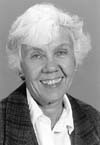
|
Dr. Eleanor Colle
Pediatrics
Known affectionately by friends and colleagues as "EC," Dr. Eleanor Colle was once named one of the best doctors in North America in a survey of 24,000 physicians. Born in Minneapolis, Colle developed a major interest in the study of metabolic childhood diseases such as diabetes and ketotic hypoglycemia. She played an important role in establishing pediatric endo-crinology as an emerging medical discipline.
Along with her husband, Dr. Lloyd Maclean, Colle was recruited to come to McGill in 1962. For the past 35 years, her academic life has been centred at the Montreal Children's Hospital and the University. From 1970 to 1980, Colle served as the director of the Montreal Children's Division of Pediatric Endocrinology and of the hospital's Hormone Laboratory.
In 1980, a sabbatic leave at the McGill Centre for Clinical Immunology and Transplantation set the stage for her second career--investigating the auto-immune process. According to Dr. Harvey Guyda, chair of the Department of Pediatrics, Colle was "equally at home in the clinic and in the research laboratory." He says that Colle was a "chercheur-clinicien even before the term was popularized."
Colle has more than 100 original publications and 17 book chapters to her credit. She has participated on scientific review committees for the U.S. Public Health Service, the Juvenile Diabetes Foundation International, the Canadian Diabetes Association (CDA) and the Fonds de la recherche en santé du Québec (FRSQ). She has also served on the Council of the American Pediatric Society, the Executive Committee of the Clinical and Scientific Section of the CDA and the Fellowship Review Committee of FRSQ.
|
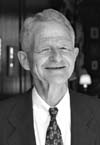
|
John Durnford
Law
A native Montrealer, John Durnford earned a McGill BA in 1949 and a BCL from the University's Faculty of Law in 1952. After being admitted to the Bar in 1953, Durnford practiced law for several years in Montreal before joining McGill as an associate professor in 1959. He served as the Dean of Law between 1969 and 1974 and was appointed the Sir William Macdonald Professor of Law in 1977.
Durnford became dean during a crucial period--the faculty's revolutionary National Programme, which aimed to train students in both of Canada's legal systems, was introduced in 1967. Durnford played a vital role in ensuring that the innovative bilingual program was successfully implemented. Prior to his appointment as dean, Durnford was the representative of the Quebec Bar to the Conference of Commissioners on Uniformity of Legislation in Canada and a member of the Advisory Council on the Administration of Justice. Durnford is currently president of both the Montreal Association for the Blind's board of directors and the Mount Royal Cemetery Company's board of trustees.
A popular teacher, Durnford has taught a wide range of courses, but his expertise in the areas of taxation and special contracts has been especially prized. The Law Students' Association recently renamed its teaching award the John W. Durnford Teaching Excellence Award.
According to law professor William Foster, Durnford's scholarship "has always reflected a deep comprehension of the practical implications of theoretical problems and has made a significant contribution to knowledge in his fields." In 1995 Durnford was the recipient of the Canadian Tax Foundation's Douglas J. Sherbaniuk Distinguished Writing Award.
|
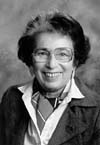
|
Rose Johnstone
Biochemistry
Rose Johnstone received a BSc from McGill in 1950 and a PhD from the University in 1953. Post-doctoral studies took her to England where she worked at the National Institute for Medical Research, the Chester Beatty Research Institute, and the Strangeways Research Laboratory.
She returned to McGill in 1956 as a research associate, and in 1961 was promoted to assistant professor of biochemistry. She was made a full professor in 1977. In 1980 she was named chair of biochemistry and under her leadership the department became one of the best academic units in Canada.
Johnstone has won many awards and honours during her career. Her work on membrane transport resulted in both the Queen's Jubilee Medal in 1978 and election to the Royal Society of Canada in 1987. She was named the Gilman Cheney Professor of Biochemistry in 1985, and in 1991 she was the Jean Manery Fisher Lecturer of the Canadian Society for Biochemistry and Molecular Biology.
Johnstone's research initially dealt mainly with the metabolism of cancer cells, but quite early her focus turned to membrane proteins and transport systems. Her major interest became sodium-dependent amino acid transport and some of her major contributions to this field were insights into the electrochemical component of this process.
Johnstone has published over 100 research papers in the top international biochemistry and physiology journals.
She has been an active member of the McGill community, serving on Senate, as treasurer and secretary of the McGill Association of University Teachers, and on countless committees of the University, Board of Governors, and the Faculty of Medicine. She has also been president of the Canadian Biochemical Society, the Montreal Physiology Society and treasurer of the Royal Society of Canada.
|
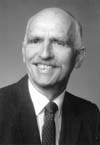
|
Angus MacKenzie
Natural Resource Sciences
Professor Gus MacKenzie came to McGill in 1962 with an impressive background in his field. He had studied soil science at the undergraduate, graduate and doctoral levels, had worked on a grain farm for five years and in the soil science departments of three universities.
When he began teaching at Macdonald Campus, he organized field trips for students in his Principles of Soil Science and in Soil Chemistry and Fertility courses "to bring the complexities of soil development and management to the students in a concrete way."
His research is also student oriented. In addition to answering questions related to soil management for agricultural production and environmental protection, he sees its purpose as providing highly trained students and technicians.
MacKenzie's early research involved the calibration of soil analyses to fertilizer requirements, work which led to the establishment of the Macdonald College Soil Testing Service. In turn, this became a model for government soil test laboratories in the province of Quebec.
His more recent research has focused on greenhouse gas emissions from agricultural soils and has shown that tillage methods, soil type and fertilization with nitrogen have a profound effect on emissions. He has also studied the effectiveness of industrial wastes as soil conditioners, using such by-products as cement kiln dust, shoe leather and de-inking sludge.
He has served as a consultant on projects in Egypt, Indonesia, China, Tanzania, the Sultanate of Oman, Algeria and Thailand, as well as advising industry in this country on land reclamation and the effects of oil spills. His list of publications is extensive and his contributions to the University include service on many McGill committees and participation in Faculty activities, including a six-year term as Associate Dean of Research.
|
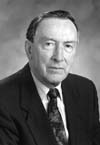
|
Wallace MacLean
Earth and Planetary Sciences
A Prince Edward Island native, Wallace MacLean attended the Colorado School of Mines to study geological engineering. After graduation, he worked at United Keno Hill Mines in the Yukon for two years and then spent five years as an economic geologist in Saudi Arabia. His work entailed geological mapping and investigation of mining sites that were operated at the time of the Prophet and in the years of the Roman Empire. He then came to McGill as a graduate student, receiving his MSc in geological sciences in 1964 and his PhD in 1968.
He became an assistant professor in 1970, and shortly after that was named director of an applied MSc program in Mineral Exploration (MINEX), a professional program to prepare students for careers in the mineral exploration and mining industry. He held this post until 1995, and MINEX graduates now work in important areas of mining and mineral exploration throughout the world.
His research interests have focused on the genesis of mineral deposits and on exploration techniques. In the mid-1970s, he began investigating volcanogenic massive sulphide deposits- -- ores formed from metal-bearing hot springs that erupt on ocean floors. The first of these was discovered at the bottom of the Red Sea, and later large deposits of this type were found in northwestern Quebec.
In addition to his teaching and research, MacLean has served as Director of Graduate Studies in the Department of Earth and Planetary Sciences, and as a member of the Graduate Student Admissions Committee and of the Graduate Faculty Council. He is the author of dozens of articles, government reports and case histories and has earned such distinctions as the Barlow Gold Medal from the Canadian Institute of Mining and Metallurgy and the Duncan R Derry Medal from the Geological Association of Canada.
|
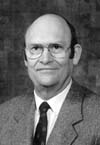
|
Peter Silvester
Electrical Engineering (Posthumous)
The Department of Electrical Engineering lost a remarkable faculty member when Professor Peter Silvester died at the age of 61 from brain cancer last fall. Silvester had been a vital member of his department--and of McGill--for 38 years.
Following studies at Carnegie-Mellon University and the University of Toronto, Silvester joined McGill in 1957 as a senior demonstrator and PhD candidate.
In his early work, Silvester was part of a small group of researchers who recognized the promise that high-speed digital electronic computers offered as a tool for use in engineering design.
His research grew to encompass computational mathematics, electromagnetic theory, materials science, man-machine communications and software engineering. According to departmental colleague Tomas Pavlasek, Silvester's papers on these subjects "are seminal milestones."
Silvester's 10 books, in many editions and in several languages, provided fundamental information supporting the work of scientists throughout the world. One book, Finite Elements for Electrical Engineers, is commonly regarded as the standard reference book in its field.
Silvester was named a Fellow of many major societies, including the Royal Society of Canada, the Institute of Electrical and Electronic Engineers and the Institution of Electrical Engineers. He held visiting appointments at Imperial College, Cambridge, Grenoble, Florence and the General Electric Research Center. For many years, he edited the journal, Electrosoft, which became a flagship publishing venue for work in software for electrical engineering applications. He was also a founding director of the software firm, Infolytica Corporation.
Silvester established his department's Computational Analysis and Design Laboratory, and as departmental chair he was instrumental in setting up Canada's very first degree program in computer engineering.
|

|
Roddy Rogers
Earth and Atmospheric Studies
A 30-year member of McGill's faculty, Professor Roddy Rogers played a key role in the development of the Department of Atmospheric and Oceanic Sciences through his research, teaching and administrative work.
A world leader in the remote sensing of the atmosphere, Rogers was among the first to see the potential offered by radar in observing the inner workings of atmospheric systems.
Born in Texas, Rogers obtained a BS from the University of Texas, a master's degree from the Massachusetts Institute of Technology and a PhD from the University of New York. He worked as a research scientist at the Cornell Aeronautical Laboratory before joining McGill in 1966.
A respected teacher, Rogers has trained several graduate students who've gone on to become scientific leaders in different parts of the world. His textbook on the physics of clouds was adopted by universities across the globe when it was first published in 1976. The third edition, published with departmental colleague M.K. Yau, remains the standard international text for graduate programs in atmospheric sciences.
As chair for nine years, Rogers played an important role in helping the department attract large grants from the Natural Sciences and Engineering Research Council and from the Atmospheric Environment Service of Canada. During his tenure, two chairs in climate research were established and the department entered a new era of research aimed at understanding the nature and evolution of our climate.
Well regarded by his peers, Rogers has been a Councilor of the American Meteorological Society, associate editor of Radio Science and chair of the National Organizing Committee for the 11th International Conference on Clouds and Precipitation.
He continues to maintain a vigorous research program.
|
|